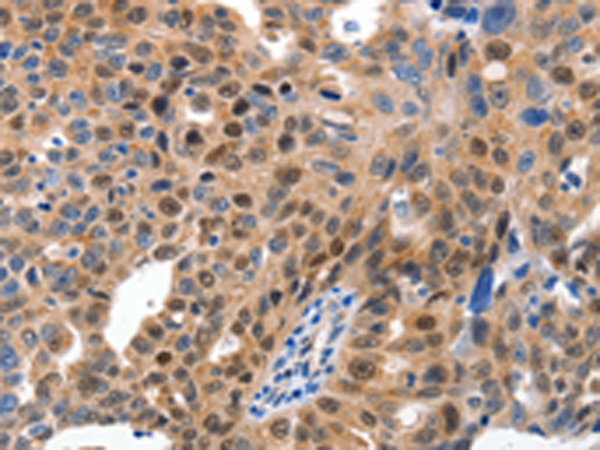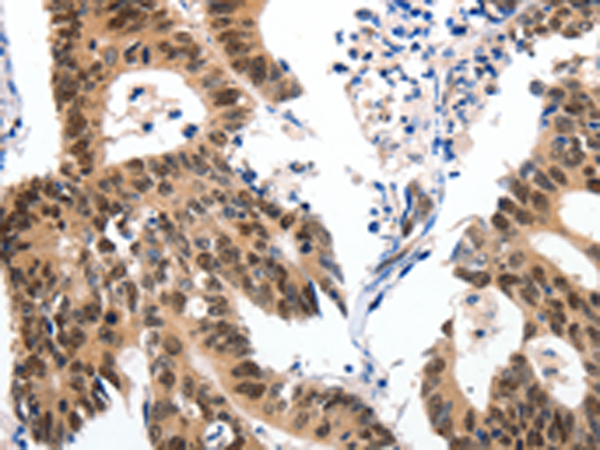


| WB | 1/500-1/2000 | Human,Mouse,Rat |
| IF | 咨询技术 | Human,Mouse,Rat |
| IHC | 1/15-1/50 | Human,Mouse,Rat |
| ICC | 技术咨询 | Human,Mouse,Rat |
| FCM | 咨询技术 | Human,Mouse,Rat |
| Elisa | 1/1000-1/5000 | Human,Mouse,Rat |
| Aliases | MCM2, CDC47, P85MCM, P1CDC47, PNAS146, P1.1-MCM3 |
| WB Predicted band size | 81 kDa |
| Host/Isotype | Rabbit IgG |
| Antibody Type | Primary antibody |
| Storage | Store at 4°C short term. Aliquot and store at -20°C long term. Avoid freeze/thaw cycles. |
| Species Reactivity | Human, Mouse |
| Immunogen | Fusion protein of human MCM7 |
| Formulation | Purified antibody in PBS with 0.05% sodium azide and 50% glycerol. |
+ +
以下是关于MCM7抗体的3篇参考文献及其摘要概括:
---
1. **文献名称**:*MCM7 as a biomarker for cervical cancer screening: A comparative study with HPV testing*
**作者**:Li J, et al.
**摘要**:本研究评估MCM7抗体在宫颈癌筛查中的应用,发现其过表达与高危HPV感染显著相关,免疫组化显示MCM7在癌前病变中的敏感性和特异性优于传统标记物,提示其作为辅助诊断工具的潜力。
---
2. **文献名称**:*Development of a novel monoclonal antibody against MCM7 for detecting proliferating cells in glioblastoma*
**作者**:Smith TL, et al.
**摘要**:报道一种新型抗MCM7单克隆抗体的开发,验证其在胶质母细胞瘤组织中的特异性,Western blot和免疫荧光显示该抗体可高效区分增殖与非增殖细胞,为肿瘤细胞增殖活性评估提供新工具。
---
3. **文献名称**:*MCM7 and PCNA interaction in hepatocellular carcinoma: Implications for prognosis*
**作者**:Wang H, et al.
**摘要**:通过免疫共沉淀和免疫组化分析MCM7与PCNA在肝细胞癌中的共表达,发现两者相互作用与患者不良预后相关,提出MCM7抗体检测可作为独立的预后标志物。
---
以上文献涵盖了MCM7抗体的临床应用、抗体开发及分子机制研究方向。
The MCM7 antibody targets minichromosome maintenance complex component 7 (MCM7), a critical protein involved in DNA replication initiation and cell cycle regulation. As part of the hexameric MCM2-7 helicase complex, MCM7 plays an essential role in unwinding DNA during replication, ensuring faithful genome duplication. Unlike other replication factors, MCM proteins are expressed exclusively during the cell cycle's G1 phase, making them reliable markers for cell proliferation.
MCM7 antibodies are widely used in research to study cell proliferation dynamics, particularly in cancer biology. Overexpression of MCM7 correlates with aggressive tumor behavior and poor prognosis, as rapidly dividing cancer cells require sustained DNA replication. These antibodies enable detection via techniques like immunohistochemistry (IHC), Western blotting, and immunofluorescence, helping distinguish proliferating cells from quiescent ones in tissues.
Clinically, MCM7 antibodies have diagnostic potential. For example, they aid in detecting cervical intraepithelial neoplasia when combined with p16INK4a staining. However, challenges persist in standardizing quantification methods and interpreting heterogeneous expression patterns across tumor types. Recent studies also explore MCM7's role in non-cancer contexts, such as viral replication interactions and stem cell dynamics. As a conserved replication licensing factor, MCM7 remains a focal point for understanding both normal cellular physiology and disease mechanisms.
×